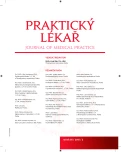Job dissatisfaction of nurses in the Czech Republic
Authors:
H. Plachá
Authors‘ workplace:
Univerzita Jana Evangelisty Purkyně v Ústí nad Labem, Fakulta zdravotnických studií. Děkan: doc. MUDr. Miroslav Tichý, CSc.
Published in:
Prakt. Lék. 2015; 95(2): 59-64
Category:
Of different specialties
Overview
The article addresses the issue of job dissatisfaction of nurses in the Czech Republic. The central theme focuses on identification of key areas of dissatisfaction with the work of nurses in health care. The basic principle of the survey, which differs from similar surveys in the Czech Republic, is the comparison between out-patient and in-patient care. In the theoretical part the field of nursing is described in a logical sequence from historical perspective to the present state. The practical part describes the comparison of two groups of nurses, those who work in ambulant or inpatient health care facilities, and in identified areas of work that lead to their job dissatisfaction. Which are: working conditions of nurses, strenuousness of profession, social status, salary, interpersonal relations, communication with doctors and length of training. For survey was chosen a quantitative method via questionnaire. The sample included 100 respondents – nurses, half from ambulatory and half from inpation care. Responses were processed via descriptive and analytical method that simultaneously involves a comparison between ambulatory and inpatient care. Research has shown that nurses in ambulatory care are more satisfied (in selected areas) than sisters from inpatient care. E.g. the sisters of ambulances assessed grades 1 and 2 to the area of strenuousness of profession (53%), social status (39%), financial rewards (31%), interpersonal relations (86%), qualification and training (51%), while sisters working in the inpatient care assed the same areas with grade 3 – strenuousness of profession (49%), social status (59%), financial rewards (48%), interpersonal relations (45%), education and qualification (41%). Our survey results were compared with authors, who conducted similar surveys. Bártlová conducted research that focused on interpersonal relationships in the workplace, where 46.3% of surveyed nurses assessed as the most common problem the relationship between doctor and nurse, which stems from nervousness or tension in their actions, resulting from work overload.
Keywords:
nursing profession – job dissatisfaction sisters – interpersonal relationships – working conditions for nurses
Sources
1. Bártlová S. Pracovní spokojenost zdravotních sester v České republice. Zdravotnictví v České republice. 2006; IX(4); 126, 168–169.
2. Bártlová S. Pracovní vztahy a kompetence všeobecných sester v České republice. Sestra 2007; 17(3): 14–17.
3. Buriánek J, Malina A. Pracovní spokojenost zdravotních sester. Zdravotnictví v České republice 2009; 12(3): 82–88.
4. Friedlová K, Anastissiadou H. Pojetí ošetřovatelství u nás a v zahraničí. In Marečková J, Vránová V. Ošetřovatelství na prahu 3. tisíciletí. Praha: Galén 2000; 27–29.
5. Jurásková D, Pacovský V. Vysokoškolsky vzdělané sestry. Sestra 2004; 14(6): 39.
6. Kutnohorská J. Historie ošetřovatelství. Praha: Grada Publishing 2010.
7. Leininger M, McFarland MR. Transcultural nursing: concepts, theories, research and practice. 3rd ed. New York: McGraw-Hill Professional, 2002. ISBN 978-0071353977.
8. Machálková L. Jaká je pracovní spokojenost sester? Diagnóza v ošetřovatelství 2008; 4(10): 26.
9. Plevová I. a kol. Ošetřovatelství I. Praha: Grada Publishing 2011.
10. Vévoda J, Ivanová K, Nakládalová M, Marečková J. Pracovní spokojenost všeobecných sester. Profese on-line 2010; 3(3): 207–220. [cit. 2014-12-01]. Dostupné z: http://profeseonline.upol.cz/archive/2010/3/POL_CZ_2010-3-8_Vevoda.pdf.
11. Zacharová E. Základy komunikace pro ošetřovatelskou praxi. Brno: Tribun EU 2011.
12. Ministerstvo zdravotnictví ČR. Vyhláška č. 55/2011 Sb., o činnostech zdravotnických pracovníků a jiných odborných pracovníků.
13. Ministerstvo zdravotnictví ČR. Zákon č. 96/2004 Sb., o podmínkách získávání a uznávání způsobilosti k výkonu nelékařských zdravotnických povolání a k výkonu činností souvisejících s poskytováním zdravotní péče a o změně některých souvisejících zákonů (zákon o nelékařských zdravotnických povoláních), jak vyplývá ze změn provedených zákonem č. 125/2005 Sb., zákonem č. 111/2007 Sb., zákonem č. 124/2008 Sb. a zákonem č. 189/2008 Sb., ve znění pozdějších předpisů (zákon o nelékařských zdravotnických povoláních).
14. Sociologický ústav AV ČR, v. v. i. Prestiž povolání – červen 2012 [online]. Dostupné z: http://www.soc.cas.cz/aktualita/tiskove-zpravy-cvvm-cervenec-2012 [cit. 2012-12-10].
15. Transformace nelékařských zdravotnických povolání [online] 2012 [cit. 2014-12-01]. Dostupné z: http://www.transformace-nelekaru.cz/index.php/vystupy-pracovni-komise/.
Labels
General practitioner for children and adolescents General practitioner for adultsArticle was published in
General Practitioner

2015 Issue 2
- Advances in the Treatment of Myasthenia Gravis on the Horizon
- Hope Awakens with Early Diagnosis of Parkinson's Disease Based on Skin Odor
- Memantine in Dementia Therapy – Current Findings and Possible Future Applications
- Memantine Eases Daily Life for Patients and Caregivers
- Possibilities of Using Metamizole in the Treatment of Acute Primary Headaches
-
All articles in this issue
- Dog’s olfactory system in medicine and human malignant or other diseases
- Job dissatisfaction of nurses in the Czech Republic
- What to tell patients about e-cigarettes?
- Hagiotherapy as a component method of psychotherapy
- Sinus pilonidalis sacrococcygealis
- Alcohol in primary health care: experiences and attitudes of Czech general practitioners
- Pseudotumor cerebri
- A personality of Czech anatomy and pathology of the 19th century: Vincenc Alexandr Bochdalek
- General Practitioner
- Journal archive
- Current issue
- About the journal
Most read in this issue
- Sinus pilonidalis sacrococcygealis
- Pseudotumor cerebri
- Job dissatisfaction of nurses in the Czech Republic
- A personality of Czech anatomy and pathology of the 19th century: Vincenc Alexandr Bochdalek
